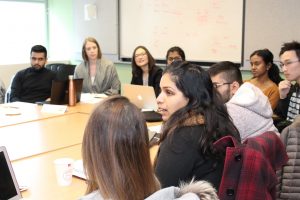Model World Health Assembly Shows the Importance of Global Mental Health
December 20/2018
By Chifum Anyakwo
Last November, the Office of Global Public Health Education & Training (OGPHET) hosted the second Model World Health Assembly (WHA) in collaboration with the Office of International Affairs (OIA) for the Health Portfolio.
Twenty-five students from diverse disciplines participated in the model assembly. They discussed and debated the issue of global mental health through a simulated WHA. A group of participants developed a pre-resolution on mental health over the month leading up to the November 23rd assembly.
“Participating in the (WHA) was a great experience! A collaborative environment which facilitated dialogue within teams and between different countries”, said Gurveer Bains, a PhD Candidate (Geography and Planning) in the Collaborative Specialization in Global Health.
“Mental health globally is such a timely and important discussion to have, one which intersects with all areas of public health.”
In early October, Students were divided into six teams representing a member state from each of World Health Organization’s six regions which were South Korea, Egypt, Russia, Uganda, India, and Canada. As these countries are vastly different culturally, politically and economically, each team was presented with the added challenge of advancing the position of their country, yet achieving consensus by the end of the meeting.
The event started with an introduction to the expert moderators; Luke Jones, Senior Advisor and Nelly Desrosiers, Senior Policy Analyst, both with the OIA. Next, Dr. Branka Agic, Manager of Health Equity at the Centre of Addiction and Mental Health and Assistant Professor (Status) at the DLSPH, provided an overview of the global burden of mental health. Mental health is fundamentally influenced by biological, psychological, social, and environmental factors said Dr. Agic.

Students during the Model WHA
Unfortunately, adequate education and treatment are not accessible to everyone. Participants were encouraged to recognise “the global burden of mental disorders, and the need to renew the comprehensive, coordinated response from health and social sectors at the country level:.
When discussing issues of global importance such as this, the moderators advised participants that it was essential to stay firm to their red lines, but also show flexibility when needed. Working in the best interests of one’s country, while also considering the goals and aspirations of other nations, is essential in such a scenario.
Through discussion, participants were able to reach consensus regarding the resolution. The final document shed light on the applicability of cultural methods to support mental health, the usefulness of acknowledging economic and social barriers to accessing mental health resources, and the importance of destigmatizing and making mental health and well-being attainable for everyone throughout the life course.
OGPHET Director Erica Di Ruggiero explained that through this event, program staff endeavoured to bring the reality of the real world within the walls of our academic institution’.
While participating in the Model WHA, students were able to exercise their critical thinking skills, debate about potential solutions to mental health (an often-overlooked field) and join forces with peers in order to consider the topic of global mental health through an interdisciplinary lens.
Participants also learned about the importance of negotiation, considering various cultural and regional understandings of and approaches towards mental health, the value of collaborating with peers to achieve consensus and the relevance of interdisciplinary approaches to global mental health.